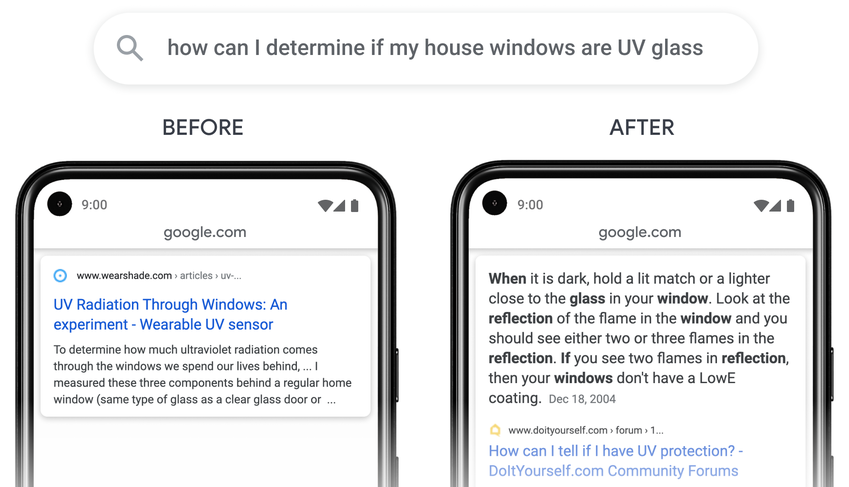Google just announced a wave of significant updates to its search engine which are taking effect in the fourth fiscal quarter of 2020. Below we have listed the ones that may impact your Google rank along with tips on how you must adapt your SEO strategy.
3 New Updates to Google Search and What Your Business Needs to Do to Protect and Improve Your Website’s Rank
Smarter Spelling
Exactly one year ago Google introduced a neural network-based technique for natural language processing (NLP) pre-training called Bidirectional Encoder Representations from Transformers (BERT). That’s a mouthful, right? All that you really need to know about BERT is that it is a more intelligent question answering system that processes words in relation to all the other words in a sentence. In other words, BERT understands the context of content, and as such can better decipher the intent behind search queries. The implications of BERT spill over into more conversational search expressions which includes voice search.
Fast forward to today, and we have an update that Google simply refers to as “Spelling”. Confirming that one-in-ten search queries are misspelled, Google has introduced a new spelling algorithm that leverages a deep neural net (including BERT) to significantly improve the search engine’s ability to understand spelling errors.
What does this have to do with you? Does it mean that you can ease up on the editorial review of your website’s articles? Certainly not, as Google still considers spelling and grammar to be extremely important when vetting content. Instead, the update infers a need to continue (or begin) adding fresh and high-quality content to your website on a regular basis. You can no longer rely on blunt-forced keyword-stuffed pages to drive organic or PPC traffic to your website. Google wants naturally written, engaging, and helpful content that answers questions in a manner that corresponds to the way that users (customers) ask them.
If content is king, then context is queen (or vice versa).
Finding Passages
This is an important one.
In an effort to deliver the most relevant answer to a given search query, Google is now digging deep into your content to find specific sentences and paragraphs (or passages) that provide exact snippets of content that users will find to be of interest. It’s not just about optimized article titles anymore.
This breakthrough update is called Passages, and is steeped in the fact that Google is now able to index individual passages from your website’s pages. In the past, the search engine would only index entire web pages.
Again, this is huge.
In response, your business must consider how well each sentence and paragraph contributes to the overall quality of a web page or blog article. Does it both pose and answer a question? Does it integrate semantically relevant words? Is it truly useful to a reader/customer? This update indicates a need to create more robust FAQ pages. It also encourages your content team to better structure the way a page or article is written. That means separating ideas with headings (preferably using H3 or H4 html tags) instead of writing them like a page in a novel.

“By better understanding the relevancy of specific passages, not just the overall page, we can find that needle-in-a-haystack information you’re looking for.” (Google, October 2020)
This more in-depth AI-driven approach is also being applied to video content. Google is now able to understand the deep semantics within a video and can automatically identify key moments. In the very near future, users will not only be delivered relevant videos in search results, they will be delivered with precise moments within videos so that they don’t have to watch a video in its entirety to find what they were looking for. The implications for businesses using video to provide instructions on product applications or installations are clear.
Digging Deeper Into Subtopics
In cases where consumers are using broad search queries, Google will now deliver a greater diversity of content, providing results that are considered to be subtopics of the original (and more broad) search query. The intent, is to anticipate and provide consumers with answers that they need even if they didn’t consider them in their initial query.
As an example, if a user searches “family dentist near me”, Google can now understand relevant subtopics, such as “braces for kids”, “dental check-ups”, or “dentist accepting new patients”, and show a wider range of content for them on the search results page. Conversion rates for consumers clicking on subtopic results will be higher given that a given result is more relevant to their actual needs.
How can you adapt your SEO strategy? By creating distinct web pages and articles for all things relevant to your product and service offering. Relying upon “catch all” pages is not going to get your site listed in subtopic search results. Returning to the “family dentist near me” example, a dental clinic would want to create unique pages for braces, checkups, new patients and every other offering. The same concept applies as much to a dentist as it does a physiotherapist, veterinarian, law firm, property developer, hotelier, higher-education institution, shipping company, and every industry in between.
The summary for how your business must adapt to these important updates is clear. You need to generate better, more engaging, and more relevant content on a regular (weekly) basis. Only then can you compete to get your web pages ranking on Google’s newly updated search engine results. Contact Strategis Consulting Group today for a FREE audit of your website’s content and current state of search engine optimization.
Guest Author: Marcus Maraih – SEO Consultant

